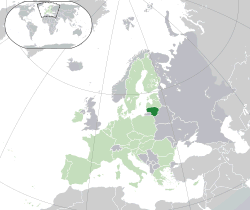 Airports in Lithuania
Airports in Lithuania

The main airports in the country included in our guide are listed below
Recommendations for travelers to Lithuania
Information about Lithuania
Population: 2,979,000 est. 2012
Capital: Vilnius 554 060 (2011) - Metro 838,852
Official Languages: lithuanian
The national flag of Lithuania is FlyLal (TE)
Main cities: Vilna, Kaunas, Butinge, Klaipeda, Siauliai, Utena, Taurage
According to your nationality, before planning your trip, please check with the embassy or consulate of Lithuania in your country of residence, if you need Visa in order to enter the country. Make sure to have the health insurance required and the valid passport, as well.
In addition to passport and visa, if you plan to travel to Lithuania, whether for business or pleasure, we suggest to review the following information: International Airports - Airport Safety Rules - baggage allowance, size and weight restrictions - Most visited cities - Driving in Lithuania - Electricity - Time Zone - Business hours - National Holidays - Weights and Measures - Rules of Etiquette and Commercial Practices
Currency: Lithuanian litas
Time Zone: (GMT+2) Summer Time (GMT+3)
The busiest airports in Europe
Year 2023 - (passengers in millions)
 Arne Müseler / www.arne-mueseler.com, CC BY-SA 3.0 DE, via Wikimedia Commons
Arne Müseler / www.arne-mueseler.com, CC BY-SA 3.0 DE, via Wikimedia Commons
Trends en Europe
Airports most searched by our users
 Calistemon, CC BY-SA 4.0, via Wikimedia Commons
1- London - (LHR) (255933 views)2- Frankfurt
- (FRA) (251016 views)3- Lisbon - (LIS) (169434 views)4- Rome - (FCO) (141270 views)5- Krakow - (KRK) (134110 views)6- Madrid
- (MAD) (128803 views)7- Paris
- (CDG) (126937 views)8- Istanbul - (IST) (126320 views)9- Amsterdam - (AMS) (114999 views)10- Munich - (MUC) (113436 views)
Calistemon, CC BY-SA 4.0, via Wikimedia Commons
1- London - (LHR) (255933 views)2- Frankfurt
- (FRA) (251016 views)3- Lisbon - (LIS) (169434 views)4- Rome - (FCO) (141270 views)5- Krakow - (KRK) (134110 views)6- Madrid
- (MAD) (128803 views)7- Paris
- (CDG) (126937 views)8- Istanbul - (IST) (126320 views)9- Amsterdam - (AMS) (114999 views)10- Munich - (MUC) (113436 views)